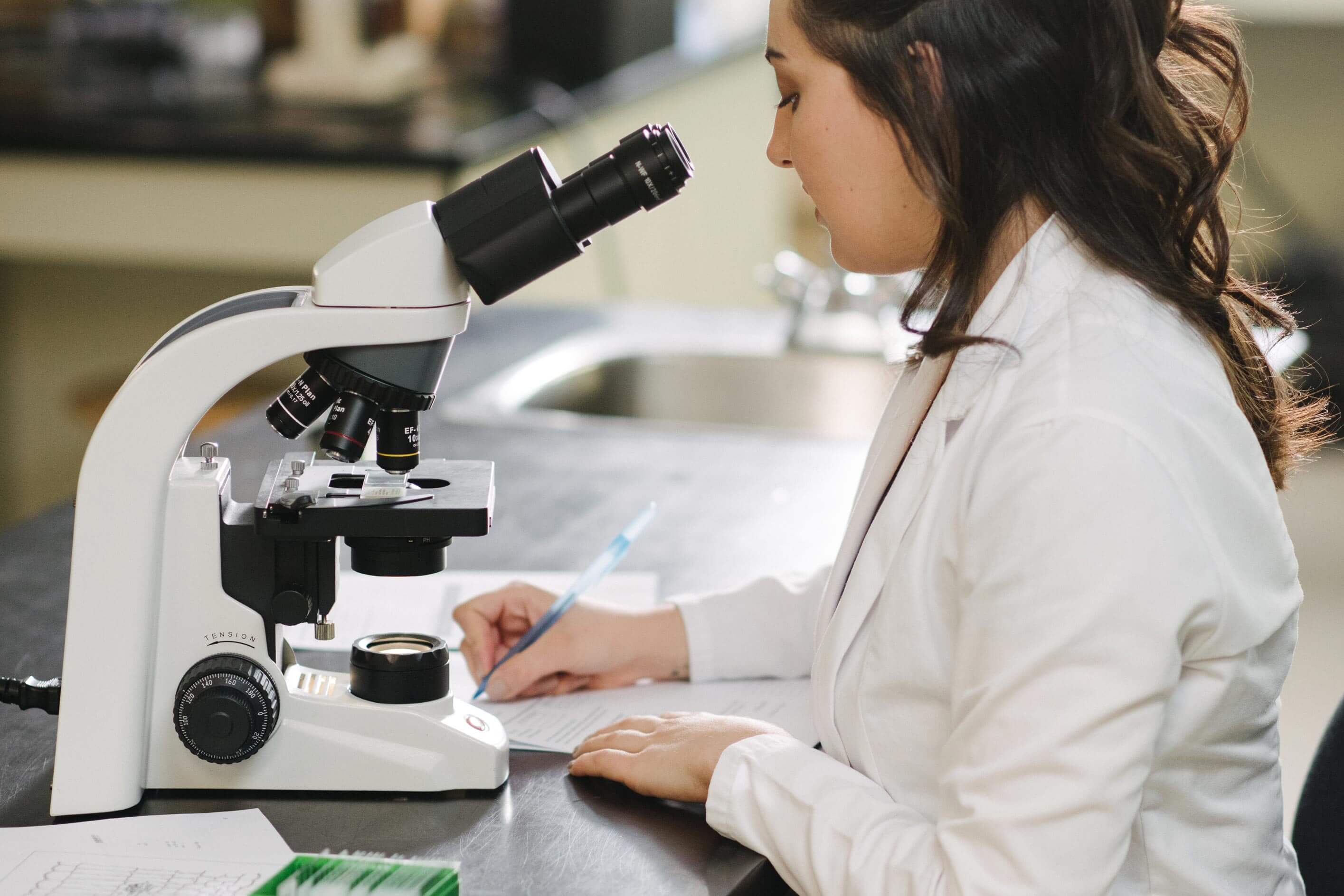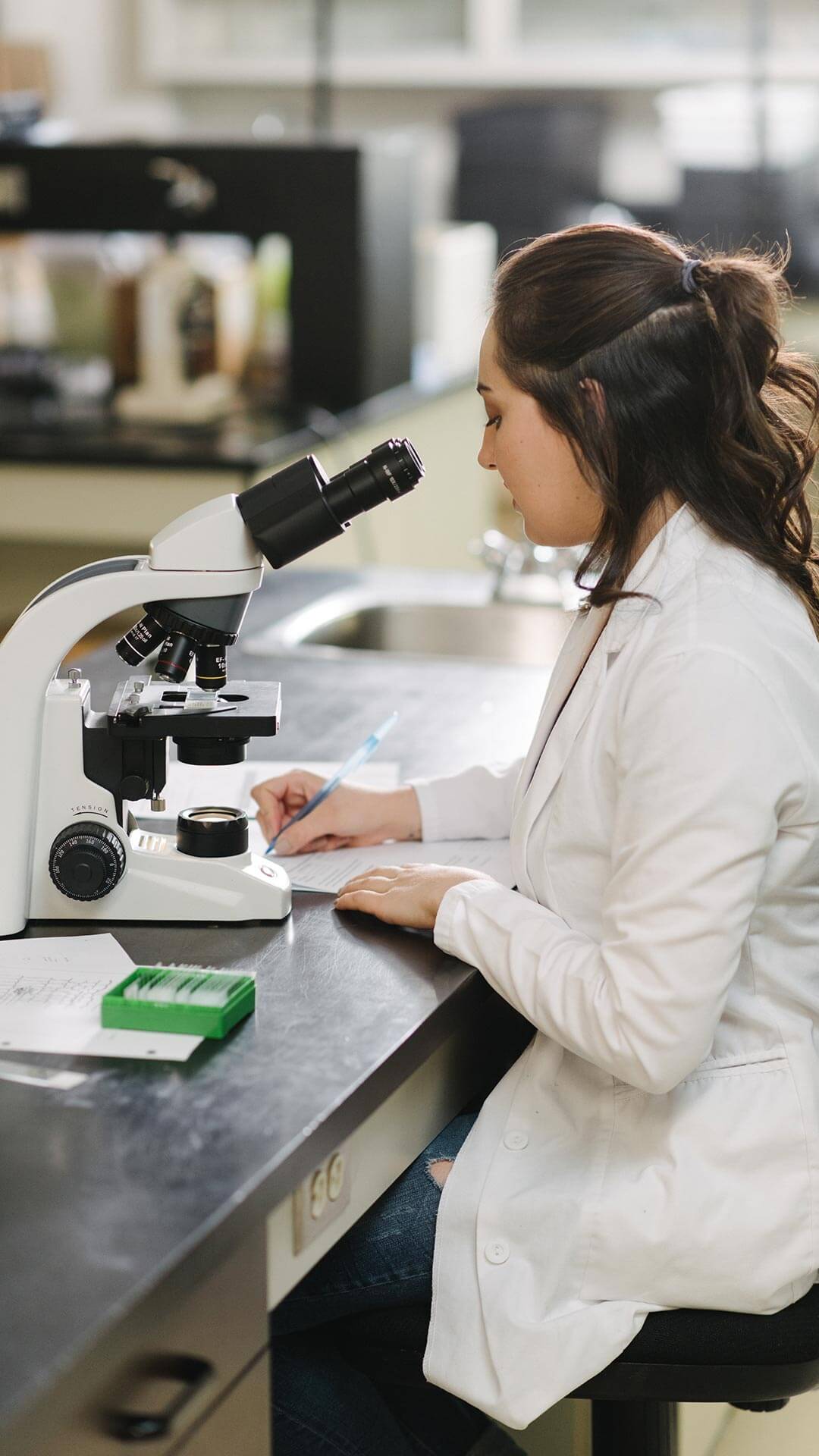Biology Courses
Cognate Requirements:
Cognate Requirements:
Minor: Biology (6 courses)
Please note: Students have the option of taking 300 and 400-level courses through the Au Sable Institute of Environmental Studies. These courses should be chosen in consultation with the department. For more information, visit ausable.org.
Course Details
Fundamentals of Biology I BIO-121
This course focuses on the molecular and cellular processes in living organisms. Topics covered in lecture and laboratory include: the structure and function of biomolecules, cell membranes, organelles, and cells; genetic replication and expression; cell cycle; and energy metabolism. Includes a weekly three-hour lab. Materials fee applies.
Prerequisites:
Grade 12 U Biology or permission of the department
Corequisites:
CHE-121
Fundamentals of Biology II BIO-122
This course explores the broad branches of the tree of life and how organisms interact with each other and with the environment. The structure and function of representative species of bacteria, protists, fungi, plants, and animals are examined in lecture and laboratory. Phylogeny and the theory of evolution are covered and discussed within a Christian framework. Includes a weekly three-hour lab. Materials fee applies.
Prerequisites:
BIO-121or permission of the instructor
Corequisites:
CHE-122
or permission of the instructor
Invertebrate Zoology BIO-224
An introduction to the major groups of living and fossil animals with emphasis on classification. Aspects of classification include methods and principles, comparative biochemistry, structure, function, growth, development, and reproduction. The importance of certain animals in fundamental biological research is emphasized. Includes a weekly three-hour lab. Materials fee applies.
Prerequisites:
BIO-122
Ecology and Evolution BIO-232
An introduction to organismal and physiological ecology (the inter-actions of organisms with their physical environment), population and community biology, and the structure and function of ecosystems. Includes a weekly three-hour lab or field work. Materials fee applies.
Prerequisites:
BIO-122
Cell and Molecular Biology BIO-242
A study of the structure and function of cells as the fundamental building units of living organisms. Topics include, but are not restricted to the molecular constituents of cells, major cell organelles, endo/exocytosis, intracellular signaling, cell growth and metabolism, and special cell functions. Methods of investigation will be examined throughout the course and the development of hypotheses and theories will be placed in a historical and contemporary context. Includes a weekly three-hour lab. Materials fee applies.
Prerequisites:
BIO-122, CHE-121
Genetics BIO-261
Discussion of the organization, replication, transmission, expression, and evolution of genetic materials. The course is organized around the levels of genes, chromosomes, organisms and populations. Topics include the expression, control and mutation of genes; the molecular organization and information coding; replication, repair, transmission and mutation of chromosomes; the relation between genes, genotype, phenotype and environment; and the genetic structure and variability of populations, including selection and speciation. Throughout the course methods of investigation will be explained. The structure and operation of genetics as a science will also receive attention. Includes a weekly three-hour lab. Materials fee applies.
Prerequisites:
BIO-122, CHE-121
Vertebrate Zoology BIO-325
An introduction to the taxonomic groups of vertebrate organisms and their defining features. Topics include comparative morphology, reproduction, development, environmental adaptation, and development of vertebrate organ systems. Includes a weekly three-hour lab or field trips. Materials fee applies.
Prerequisites:
BIO-122
Field Biology BIO-333
A course designed to increase the exposure of students to organisms in their field settings. Topics discussed include biogeography, the observation of the integration of structural and functional diversity in local ecosystems, techniques in taxonomy, population sampling, and hypothesis testing in the field. Some field work will be scheduled for Saturdays. Includes a weekly three-hour lab or field work. Materials fee applies.
Prerequisites:
BIO-232
Perspectives on Evolution BIO-335
An examination of the science, history and philosophy of science, and biblical interpretation as it relates to the development of the theory of evolution and evolutionary worldviews. Students and faculty will evaluate and discuss together various perspectives on evolution and communicate their own understanding of evolution from a Christian worldview.
Prerequisites:
Year 3 or 4 standingBIO-334 is the Capstone Course in the Biology Department and is required for all majors in the 3rd or 4th year.
Physiological Psychology BIO-336
This course will examine some of the global issues in psychology that touch on the relationship between neurological mechanisms and human personhood. Students will study introductory neurophysiology and neuroanatomy, concentrating on neural and synaptic transmission and basic subdivisions of the nervous system. Building on this foundation, various topics will be discussed including lateralization of functions,
sensory systems, motivation and regulatory systems, emotional behaviour, learning and memory, and brain damage and related disorders.
Prerequisites:
PSY-121 or PSY-122
Plant Physiology BIO-343
An examination of physiological mechanisms of plant growth and development. Topics include water relations, the movement of water and solutes, photosynthesis, nutrition, the production of plant substances, plant hormones, photomorphogenesis, and periodism. Includes a weekly three-hour lab. Materials fee applies.
Prerequisites:
BIO-122
Microbiology BIO-351
An introductory course which provides an understanding of microbial structure and biochemistry and includes practical experience in the handling and maintenance of microbial cultures. Topics include the classification and identification of microorganisms, the role of micro-organisms in health and disease, and the application of microbial processes in industry. Includes a weekly three-hour lab. Materials fee applies.
Prerequisites:
BIO-242
Biochemistry I: Structures and Functions of Biomolecules BIO-361
An introduction to the structure, function and analysis of the major classes of biomolecules found in living organisms: proteins, carbohydrates, lipids and nucleic acids. Includes an introduction to the structure and function of enzymes. Includes a weekly three-hour lab. Materials fee applies.
Prerequisites:
CHE-221
Recommended:
BIO-242, CHE-222
Developmental Biology BIO-363
A study of the molecular and cellular events involved in the development of plants and animals. Emphasis is placed on certain model organisms and topics covered include oogenesis, spermatogenesis, fertilization, cleavage, morphogenesis, cell interactions, induction, cell differentiation, pattern formation, and sex determination. Includes a weekly three-hour lab. Materials fee applies.
Prerequisites:
BIO-261
Senior Seminar I BIO-381
These courses consist of a weekly one-hour seminar that explores the contexts for the
discipline of biology, including historical, theological, ethical, societal, and vocational
dimensions. The seminars will also equip students to carry out scientific research
in the fields of biology.
(0.75 credits each)
Prerequisites:
Year 3 or 4 standing in a Biology major
Senior Seminar II BIO-382
These courses consist of a weekly one-hour seminar that explores the contexts for the discipline of biology, including historical, theological, ethical, societal, and vocational dimensions. The seminars will also equip students to carry out scientific research in the fields of biology.
(0.75 credits each)
Prerequisites:
Year 3 or 4 standing in a Biology major
Senior Seminar III BIO-383
These courses consist of a weekly one-hour seminar that explores the contexts for the discipline of biology, including historical, theological, ethical, societal, and vocational dimensions. The seminars will also equip students to carry out scientific research in the fields of biology.
(0.75 credits each)
Prerequisites:
Year 3 or 4 standing in a Biology major
Senior Seminar IV BIO-384
These courses consist of a weekly one-hour seminar that explores the contexts for the discipline of biology, including historical, theological, ethical, societal, and vocational dimensions. The seminars will also equip students to carry out scientific research in the fields of biology.
(0.75 credits each)
Prerequisites:
Year 3 or 4 standing in a Biology major
Comparative Animal Physiology BIO-426
This course examines different physiological processes seen in the animal kingdom that allow organisms to maintain homeostasis while inhabiting diverse climates and dynamic environments. Topics include aquatic and aerial respiration, cardiovascular systems, water and solute balance, excretion, cellular energetics, membrane physiology, nervous systems, cell movement, and endocrinology. Materials fee applies.
Prerequisites:
BIO-224 or 325
Toxicology BIO-445
Toxicology is the field of study which seeks to understand the adverse effects of toxic substances (chemical, physical, and/or biological) to living organisms. Fundamental concepts will be addressed such as dose-response relationships, mechanism of uptake, transport, distribution and storage of xenobiotics, detoxification and depuration, target organ toxicity and physiological consequences (e.g. teratogenesis,
mutagenesis, carcinogenesis), and risk assessment techniques. Includes a weekly three-hour lab. Materials fee applies.
Prerequisites:
BIO-242 or 261
Biochemistry II: Enzymes and Metabolism BIO-462
An investigation of the kinetics and regulation of enzyme catalyzed reactions, the principles of metabolism, and the central metabolic pathways, including glycolysis, gluconeogenesis, the pentose phosphate pathway, the citric acid cycle, the electronic transport chain, fatty acid metabolism, and amino acid metabolism. Includes a weekly three-hour lab. Materials fee applies.
Prerequisites:
BIO-361
Advanced Techniques in Biochemistry & Molecular Biology BIO-463
This course will provide students with an immersion into the world of molecular biology research. Students will investigate unique research questions within a teambased laboratory setting. Throughout the course, students will gain experience with project and experimental design, various laboratory techniques, data analysis and interpretation, as well as the honing of oral and written communication skills. This course is particularly intended for students interested in graduate studies, or careers in the research field. Includes a weekly three-hour lab. Materials fee applies.
Prerequisites:
BIO-261,
BIO-361,
BIO-351Recommended: HSC-342
Internship BIO-480
A one-term training experience in a specific area of biology. The purpose of the internship is to give students on-the-job experience and to help students in making career decisions and in preparing students for post-graduate education and for employment opportunities.
Prerequisites:
Year 4 standing
Honours Independent Study BIO-485
Available in areas that are not currently covered in, or are the focus of, other 400-level courses. Some examples are: nutrition, parasitology, mycology, zoonotics, developmental biology, cancer, botany. The area of study needs to be approved and supervised by a faculty member. For information on setting up an independent study see page 60 of the Academic Calendar.
Prerequisites:
Year 4 standing
Honours Research Project BIO-490
This course is typically a one-term undergraduate student research project that
has been approved by a biology faculty. Students will plan and execute their research
project then analyze, interpret, and present their results. The course is especially
intended for students interested in continuing their scientific education at the graduate
level. For more information on setting up an independent research project, see page 61 of the Academic Calendar. Materials fee applies.
Prerequisites:
Year 4 standing
History & Philosophy of Science SCI-310
An introduction to key topics in the history and philosophy of Western science. The course explores how scientific ideas (in the past and now) are situated historically and culturally, are informed by worldviews, and shape worldviews.
Prerequisites:
Year 3 or 4 standing
Physics for the Life Sciences PHY-115
An introduction to physical phenomena basic to the health sciences, physical education, and biology. Included are topics which apply to the life sciences: mechanics and properties of matter, heat, wave phenomena, electricity and magnetism, modern physics, basic electronics, measurement, and data analysis. Includes a weekly lab. Materials fee applies.
Prerequisites:
Any Grade 12 U or M mathematics or permission of the instructor
Physics I: Newtonian Mechanics PHY-121
An introductory, calculus-based study of the physical world. The course covers mechanics and other selected topics. Includes a weekly lab. Materials fee applies.
Prerequisites:
Grade 12 U Calculus
Corequisites:
MAT-121
Physics II: Waves, Heat and Time PHY-122
A continuation of PHY-121, this course covers selected topics in wave motion, thermodynamics, optics, and modern physics. Includes a weekly lab. Materials fee applies.
Prerequisites:
PHY-121
Corequisites:
MAT-122



